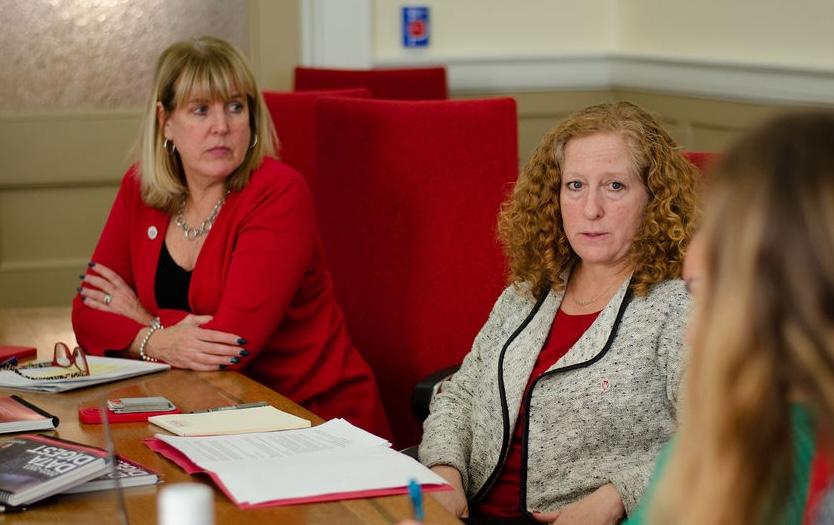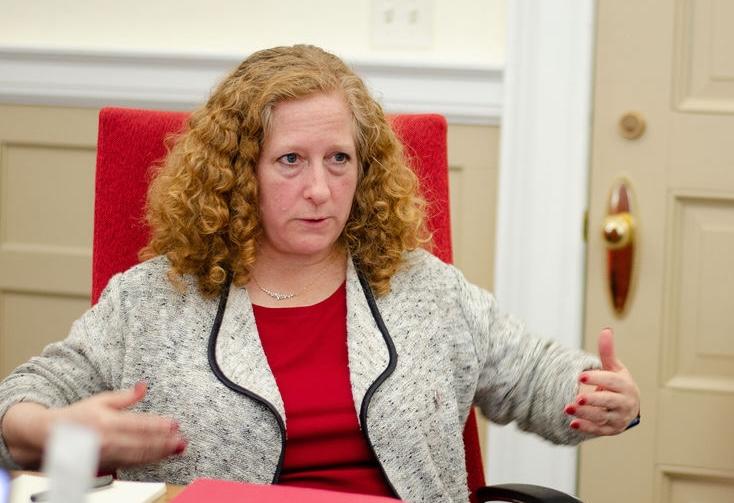University of Wisconsin–Madison Chancellor Jennifer Mnookin met with student journalists Thursday — the day after the Universities of Wisconsin Board of Regents approved a funding deal that disburses employee pay raises, funding for dorm renovations and a new engineering building in exchange for diversity, equity and inclusion priorities.
Mnookin worked with UW President Jay Rothman and Wisconsin State Assembly Speaker Robin Vos (R-Rochester) to reach the proposal, but said the process was “difficult and challenging,” requiring compromise.
“It was important to attempt to find some compromise in the interest of our current students, our future students, our employees,” Mnookin said. “In the state of Wisconsin, the citizens benefit from having a strong flagship university.”
Amid potential changes to DEI priorities, Mnookin emphasized ensuring all students and employees can thrive at UW–Madison will remain a top priority. She pointed to the university administration’s opportunity to strengthen UW–Madison’s diversity purpose and to improve the ways with which student success and student experience are addressed.
SSFC passes 2025 RecWell budget, hears Wisconsin Union segregated fee change request
Mnookin emphasized the importance of strengthening UW–Madison — not only for students and faculty, but for the state of Wisconsin.
“It’s my goal to make UW–Madison as strong as it can be,” Mnookin said. “We need to continue to work to demonstrate the incredible importance to our state’s future.”
Mnookin said supporting the “belonging, success and flourishing” of students of different identities, backgrounds and beliefs is a key element to strengthening UW–Madison, and remains a key priority in her second year as chancellor.

Vice Chancellor for Student Affairs Lori Reesor echoed this sentiment, adding that student support at UW–Madison ensures students are successful both in and out of the classroom. Reesor said Student Affairs has been especially focused on supporting students following attacks made on Israel by Hamas — a militant group that governs the Gaza Strip and is classified by the U.S. as a terrorist group — Oct. 7.
The ongoing Israel-Hamas war has drawn demonstrations in support of the state of Israel and the Palestinian people on and around campus. Reesor said it has impacted students of different religious identities on campus.
UW Colombian Badgers Celebrate Día de las Velitas at Union South
“We’ve done a lot of outreach to Jewish students, to Muslim students,” Reesor said. “Unfortunately some of their experiences on campus have been similar in that they don’t feel supported, they don’t feel safe, they don’t feel that they can represent their full identity.”
Reesor said this outreach has led her and the Student Affairs team to begin focusing on ways to better educate campus students and staff about religious identities and religious minority identities. She pointed to the recently opened Center for Interfaith Dialogue, which provides students with resources and programming for the exploration of religious identities.
Mnookin also commented on the Israel-Hamas war, saying she’s spent time “listening and engaging” with students and community members affected by the events abroad, and by related events and actions closer to home.
Mnookin stressed that she remains focused on civil dialogue and engagement across differences, but acknowledges the challenges posed by the First Amendment’s application to UW–Madison. Mnookin emphasized the importance of creating a community in which free speech and engagement across differences are acknowledged.
“I would also ask that in the ways that we communicate with each other about this, that we are attentive to and recognize that there are many viewpoints on these issues, and many ways that words can be heard,” Mnookin said.














